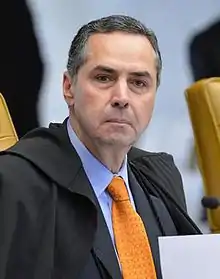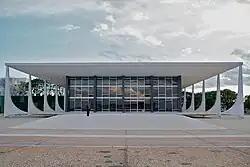Luís Roberto Barroso | |
|---|---|
 Barroso in 2014 | |
| Justice of the Supreme Federal Court | |
| Assumed office 26 June 2013 | |
| Appointed by | Dilma Rousseff |
| Preceded by | Ayres Britto |
| President of the Supreme Federal Court | |
| Assumed office 28 September 2023 | |
| Vice President | Luiz Edson Fachin |
| Preceded by | Rosa Weber |
| Personal details | |
| Born | 11 March 1958 Vassouras, Rio de Janeiro, Brazil |
| Spouse |
Tereza Cristina van Brussel
(died 2023) |
| Children | 2 |
| Alma mater | |
Other judicial positions
| |
Luís Roberto Barroso (born 11 March 1958) is a Brazilian law professor, jurist, Justice and President of the Supreme Federal Court of Brazil, having been nominated to the position by President Dilma Rousseff in 2013. Since 25 May 2020, Barroso has also served as President of the Superior Electoral Court.[1]
Barroso graduated in law from the Universidade do Estado do Rio de Janeiro (UERJ), holds a Master's Degree in law from Yale University, and a PhD from UERJ. He has done post-doctoral studies at Harvard Law School and he is a professor of Constitutional Law at UERJ.
He is considered a liberal and progressive Justice,[2][3] making landmark votes on the legalization of abortion in pregnancies originated from rape[4] and the criminalization of homophobia and transphobia in Brazil.[5]
Life and career
Born in the city of Vassouras, Barroso received a bachelor's degree in law from the State University of Rio de Janeiro (UERJ) in 1980, and an LL.M. from Yale Law School in 1987. He received a doctorate in public law from UERJ in 2008 and is a tenured professor of constitutional law at the university.[6][7] In 2011, Barroso was a visiting scholar at Harvard Law School, and while in the United States published the paper "Here, there and everywhere: human dignity in contemporary law and in the transnational discourse".[8]
At 2011, Barroso became nationally known for being the lawyer of the militant Cesare Battisti in Brazil. Barroso implemented a defense that argued that his client's actions were justified because the actions were part of Battisti's fight against an authoritarian Italian regime.[9]
Barroso owned the law firm Luís Roberto Barroso & Associados in Rio de Janeiro, which specialized in public law and Supreme Court litigation.[8] Prior to being nominated to the Supreme Federal Court by Dilma Rousseff in May 2013 to replace Justice Carlos Ayres Britto, Barroso served as a state attorney in Rio de Janeiro state. He was the fourth Supreme Court nominee of Rousseff, who had previously nominated the justices Luiz Fux, Rosa Weber and Teori Zavascki.[10] He was confirmed by the Federal Senate in early June, and was sworn into office on 26 June 2013.[11]
Barroso has been invited to lecture in various universities around the world, including the prestigious New York University School of Law, in the United States, and London School of Economics and Oxford University, in England.[12][13]
Barroso is an advocate for drug legalization, starting with decriminalizing the possession of marijuana for private consumption.[14] His judicial views have been described as progressive.[15]
References
- ↑ Teixeira, Matheus; Fernandes, Talita (24 May 2020). "Barroso assume TSE em meio a ações que miram chapa Bolsonaro-Mourão" (in Portuguese). Folha de S. Paulo. Archived from the original on 26 May 2020. Retrieved 25 May 2020.
- ↑ "Um progressista no Supremo". Valor Econômico (in Brazilian Portuguese). Archived from the original on 29 September 2023. Retrieved 3 August 2021.
- ↑ "10 opiniões que fazem de Barroso o liberal mais poderoso do Brasil". Instituto Mercado Popular. 10 September 2017. Archived from the original on 23 January 2022. Retrieved 3 August 2021.
- ↑ "Turma do STF decide que aborto nos três primeiros meses de gravidez não é crime". Agência Brasil (in Brazilian Portuguese). 29 November 2016. Archived from the original on 30 October 2022. Retrieved 3 August 2021.
- ↑ "Julgamento da ADO 26 e do MI 4733 – omissão legislativa em criminalizar a homofobia e a transfobia – Luís Roberto Barroso" (in Brazilian Portuguese). Archived from the original on 4 February 2022. Retrieved 3 August 2021.
- ↑ "Composição Atual :: STF – Supremo Tribunal Federal". STF. 1 July 2013. Archived from the original on 30 January 2019. Retrieved 20 September 2015.
- ↑ Luís Roberto Barroso Archived 26 August 2018 at the Wayback Machine stf.jus.br
- 1 2 "Prof. Luís Roberto Barroso '89 LLM to Discuss Brazil's Unbalanced Democracy". law.yale.edu. Archived from the original on 23 September 2020. Retrieved 1 September 2018.
- ↑ "O advogado que garantiu a liberdade de Battisti". Archived from the original on 29 June 2023. Retrieved 29 November 2023.
- ↑ "Dilma indica constitucionalista Luís Roberto Barroso para o STF". 23 May 2013. Archived from the original on 2 September 2018. Retrieved 1 September 2018.
- ↑ "Luís Roberto Barroso toma posse como ministro do Supremo". 26 June 2013. Archived from the original on 2 September 2018. Retrieved 1 September 2018.
- ↑ "Brazil: Looking Beyond the Crisis | NYU School of Law". www.law.nyu.edu. Archived from the original on 7 May 2023. Retrieved 29 November 2023.
- ↑ "Brazil Forum UK". BRAZIL FORUM UK. Archived from the original on 7 May 2023. Retrieved 29 November 2023.
- ↑ "Brazil must legalise drugs, existing policy destroys lives". TheGuardian.com. 15 November 2017. Archived from the original on 16 November 2017. Retrieved 15 November 2017.
- ↑ "Um progressista no Supremo". Archived from the original on 16 August 2018. Retrieved 1 September 2018.
